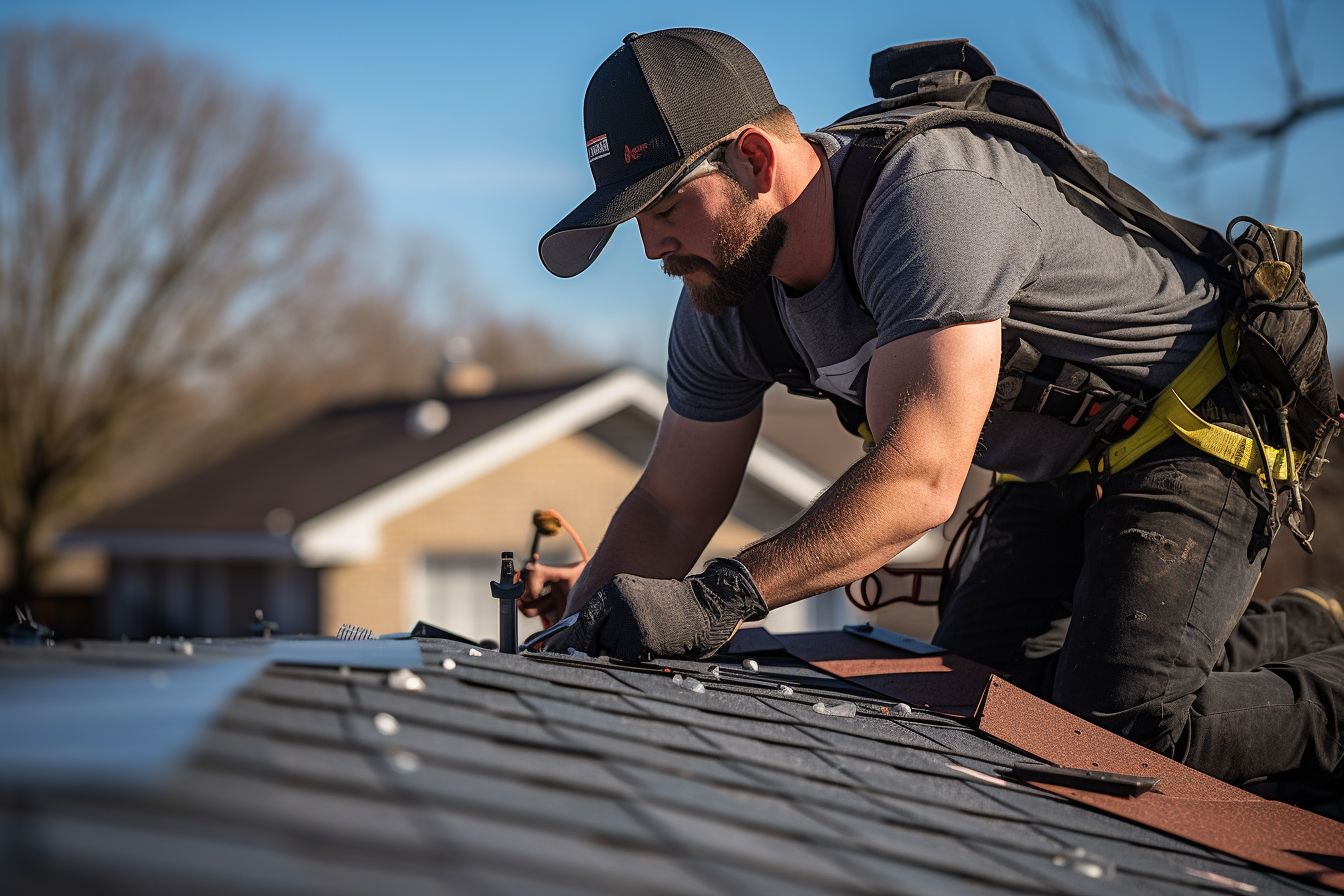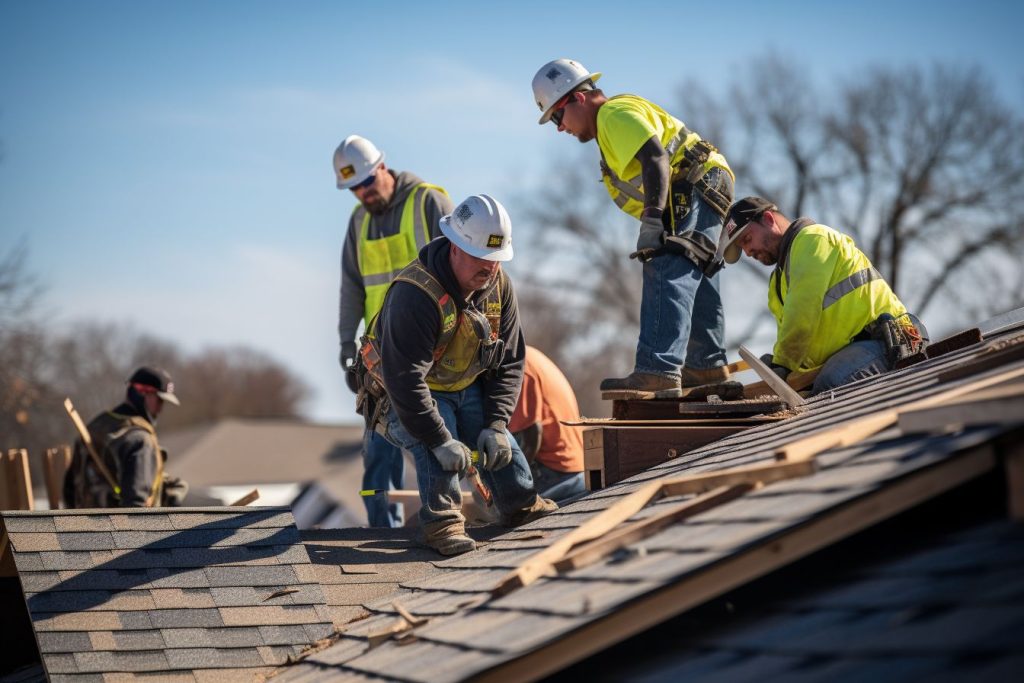Choosing the right roof replacement contractor can be a daunting task. Did you know there’s a significant difference between independent contractors and roofing companies? This article will serve as your handy guide, offering effective tips to help you decide about hiring the best specialist for your roofing needs.
Let’s dive in and start making sense of this critical process!
Key Takeaways
- Differentiate between independent contractors and roofing companies for your roof replacement project.
- Before deciding, verify the contractor’s qualifications, experience, licensing, insurance, and past work.
- Get written estimates and timelines to ensure clear communication and avoid misunderstandings.
- Discuss the cleanup strategy with your chosen contractor to ensure they understand your expectations.
Qualifications and Experience of the Contractor

Differentiate between independent contractors and roofing companies, check for proper licensing and insurance, and verify their experience and past work.
Differentiate between independent contractors and roofing companies

Independent contractors and roofing companies bring different benefits to a roofing project. Roofing contractors often have specialized expertise and years of experience in roof repair and replacement services, becoming entrenched experts in their field.
General building contractors may lack this specialization, although they possess many construction skills. One notable difference lies in the execution phase – independent contractors usually hire subcontractors to complete various job elements, while roofing companies manage every aspect from start to finish.
This end-to-end management by roofing specialists can simplify interaction as you only deal with one primary contact throughout your project. However, skilled general contractors can also handle your roofing needs effectively but may require scrutiny for specific roofing competence.
Check for proper licensing and insurance.
Choosing the right roof replacement contractor requires a critical look at their licensing and insurance.
- Start by ensuring the contractor possesses the required licenses and certifications. This will assure you of their professional standing.
- Next, verify their experience and past work, checking for details about previous projects they’ve handled.
- Requesting evidence of insurance from the roofing professional is essential to safeguard against potential liabilities.
- Always confirm the contractor’s licensing and insurance credentials. Unlicensed contractors may provide cheaper services but can also pose serious risks.
- Don’t forget to seek proof of valid permits. A legitimate roofing contractor must be able to procure the necessary permits for your roofing project.
- Ask for confirmation of the contractor’s credentials and insurance coverage as a safety measure.
- Making sure the contractor has valid licensing and insurance not only protects you but also assures quality workmanship.
Verify their experience and past work.
Assessing the contractor’s background and portfolio is a key step in selecting a roof replacement expert. You should validate their expertise by requesting detailed information about previous projects.
This process aids you in understanding their abilities, workmanship quality, and whether they have specific experience in roof replacement.
Taking into account only recommendations or relying purely on intuition without probing the contractor’s past performance can lead to potential risks. You must investigate the qualifications of everyone involved with your roofing project to ensure they are qualified for the task at hand.
Check if your contractor has a proven track record in roof replacement and doesn’t depend on inexperienced subcontractors for their jobs. Lastly, evaluate references from former clients as it provide insight into their experiences with the contractor under consideration.
Communication and Documentation
Get everything in writing, including estimates and timelines, to ensure clear communication and avoid misunderstandings.
Get everything in writing, including estimates and timelines.
Ensure all communication and documentation with your roof replacement contractor is written down. This includes getting written estimates and timelines. It is important to record the agreed upon costs and project schedule to avoid any misunderstandings later on. Having everything in writing, you can refer to it if any issues arise during the project.
Discuss the cleanup strategy.
Proper communication and documentation are crucial in selecting the right roof replacement contractor. When discussing the cleanup strategy, ensuring that your chosen contractor understands your expectations regarding post-installation cleanliness is essential.
This includes removing any debris or materials left over from the roofing process. You can ensure a smooth and efficient roof replacement process by clearly communicating your requirements and obtaining written documentation of their commitment to a thorough cleanup.
A reputable contractor will prioritize the cleanup aspect of the project, providing you with peace of mind knowing that they will leave your property clean and tidy after completing the job.
Provide detailed information about your roofing project
When working with a roofing contractor, it is crucial to provide detailed information about your roofing project. This includes specific details such as the size of your roof, desired timeline for completion, and any specific materials or expertise required.
By clearly outlining your project’s needs and expectations from the start, you can ensure that the contractor has all the necessary information to provide an accurate estimate and effectively plan for the work ahead.
Additionally, providing clear documentation or photos of any existing damage or problem areas can help communicate and understand between you and the contractor throughout the process.
These steps will help facilitate effective communication and ensure your roofing project is completed smoothly and according to your specifications.
Considerations for Hiring
Consider more than just the price, prioritize quality, discuss warranties and safety measures, and ask about permits and unplanned repairs. Read on to find out other factors to consider when hiring a roof replacement contractor.
Look beyond price and prioritize quality.
When hiring a roofing contractor, looking beyond the price and prioritising quality is crucial. While cost may be essential, focusing solely on the lowest bid can lead to subpar workmanship and potential issues.
Instead, consider factors such as experience, reputation, and qualifications. A reputable contractor with years of experience will have the necessary skills to handle your roof replacement effectively.
Additionally, checking for certifications and qualifications ensures they meet industry standards. By prioritizing quality over cost, you can ensure a well-executed roofing project that will benefit your home in the long run.
Discuss warranty and safety measures.
Contractors should be able to provide information and assurances about the warranty and safety measures for your roof replacement project. Here are some important considerations:
- Warranty coverage: Inquire about the warranty offered by the contractor on both materials and workmanship. Ensure the warranty duration aligns with industry standards, giving you peace of mind against unexpected issues.
- Safety precautions: Discuss the safety practices implemented by the contractor during the project. Ask if they follow safety regulations and maintain a clean worksite to avoid accidents or damage to your property.
- Liability coverage: Seek clarification on liability insurance coverage. A reputable contractor should carry adequate insurance to protect you in case of any unexpected accidents or damages during the project.
- Compliance with regulations: Confirm if the contractor adheres to local building codes and obtains necessary permits for roof replacements. This ensures compliance with legal requirements and more reliable workmanship.
- Maintenance recommendations: Inquire about recommended maintenance procedures after installing your new roof. Understanding how to care for your roof properly can help prolong its lifespan and prevent unnecessary repairs in the future.
Ask about permits and unplanned repairs.
Permits may be required for roof replacement jobs. Homeowners should inquire whether the roofing contractor will handle the permit process or if it is their responsibility. It is important to know the permit requirements for roof replacement to ensure compliance with local building codes. Understanding how the contractor handles unplanned repairs during the project can aid in anticipating unexpected issues. When hiring a roof replacement contractor, asking about permits and unplanned repairs helps homeowners make an informed decision.
- Permits for roof replacement
- Roofing contractor responsibilities
- Local building codes
- Roof replacement permit requirements
- Handling of unplanned repairs
- Contractor’s approach to unexpected issues
- Permit process for roof replacement
- Compliance with building codes
- Anticipating unforeseen problems
- Informed decision-making in hiring a contractor
Reference to a Complete Handbook for Roof Replacement

To ensure you have all the information you need for a successful roof replacement, we recommend referring to a complete handbook specifically designed for this purpose. This comprehensive guide will provide valuable insights and tips on selecting the best roofing contractor, communicating effectively with them, and understanding your rights as a consumer.
It may also include Mike Holmes’ 10 tips for choosing a roofing contractor, which can help you make an informed decision. By consulting this handbook, you’ll know how to navigate the process confidently and achieve long-lasting results for your new roof.
Conclusion

When choosing a roof replacement contractor, it’s important to do your due diligence. Look for experience, proper licensing and insurance, and get everything in writing.
Don’t forget to check references and meet with the contractors in person. Remember, price shouldn’t be the only factor – prioritize quality and reputation when deciding.
FAQs
1. What qualifications should I look for in a roof replacement contractor?
Look for a roof replacement contractor licensed, insured, and experienced in handling similar projects. It’s also essential to check for certifications or affiliations with professional organizations.
2. How can I verify the reputation of a roof replacement contractor?
You can verify the reputation of a roof replacement contractor by checking online reviews, asking for references from past clients, and looking into their track record with the Better Business Bureau or local consumer protection agencies.
3. Should I get multiple quotes before choosing a roof replacement contractor?
Yes, getting multiple quotes from different contractors is recommended to compare prices and services offered. This will help you make an informed decision and get a fair deal.
4. Is it necessary to have a written contract with the chosen roof replacement contractor?
A written contract is essential when working with a roof replacement contractor as it outlines all the details of the project, including timelines, materials used, costs involved, and warranties or guarantees provided.
5. What questions should I ask before hiring a roof replacement contractor?
Before hiring a roof replacement contractor, some important questions include: Are you licensed and insured? Can you provide references? How long have you been in business? Do you offer any warranties on your work? Will there be subcontractors involved in the project?

